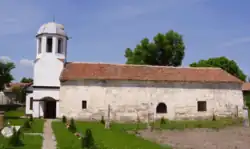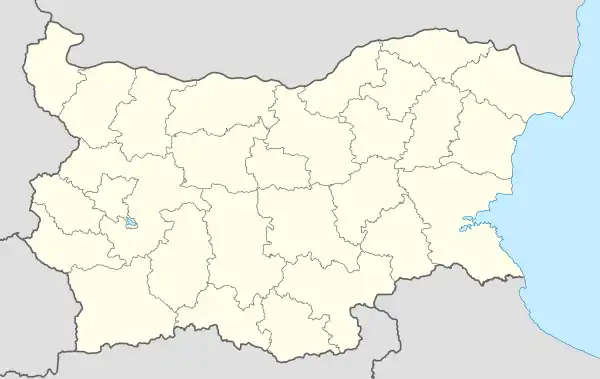Gigen
Гиген | |
|---|---|
 The Church of St George in Gigen | |
 Gigen Gigen | |
| Coordinates: 43°42′N 24°29′E / 43.700°N 24.483°E | |
| Country | |
| Province (Oblast) | Pleven |
| Government | |
| • Mayor | Krasimir Parvanov (Ataka) |
| Elevation | 39 m (128 ft) |
| Population | |
| • Total | 2,123 |
| Time zone | UTC+2 (EET) |
| • Summer (DST) | UTC+3 (EEST) |
| Postal Code | 5970 |
| Area code | 06562 |
Gigen (Bulgarian: Гиген, pronounced [ɡiˈɡɛn]) is a village in northern Bulgaria, part of Gulyantsi Municipality, Pleven Province. It is located near the Danube River, close to the place where the Iskar River empties into it, opposite the Romanian town of Corabia.
Gigen is most famous for being built on the site of the important Roman colony of Oescus. The extensive ruins are located in the northwestern part of the village and were first associated with the ancient colony in the end of the 17th century. A bridge, built or reconstructed by Constantine I and named Constantine's Bridge in his honour, linked Oescus with Sucidava (modern Corabia) across the Danube in the 4th century.
Gigen is also known for an anti-Bogomil inscription in Old Bulgarian dating to the 10th century, the rule of Tsar Peter I of Bulgaria. The text was discovered in the old village church, inscribed on a stone block 85 centimetres in width. According to the scientifically accepted reading, the text of the inscription is as follows:[1]
иже ... проч[ътет]ъ [еже нап]иса(х) [да проклъ]нетъ [ер]етика. аще бо и не про[клънетъ]. то д[а бѫ]детъ самъ проклѧ[тъ аще ж]е проклънетъ еретика. то [с]его бъ҃ гъ҃ помилоуетъ + се же писа анани мо[нахъ].
The one... who reads [what I wrote] [should curse] the heretic. If they do not curse him, then they shall be cursed themselves. Or if they curse the heretic, may God have mercy on them + So wrote the [monk] Anani.
As of December 2009, Gigen has a population of 2,192 inhabitants.[2] It lies at 43°42′N 24°29′E / 43.700°N 24.483°E, at 39 m above sea level.
Honour
Gigen Peak on Graham Land in Antarctica is named after the village.
References
- ↑ "Ананиев противобогомилски надпис от X в. от с. Гиген (Екхус)" (in Bulgarian). Bibliotheca Slavica. 2008-07-27. Archived from the original on 2011-07-06. Retrieved 2008-07-27.
- ↑ (in English) Bulgarian National Statistical Institute - Bulgarian Settlements 1000-5000 inhabitants - December 2009